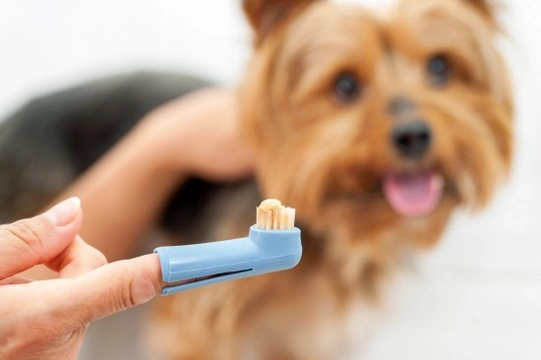Pets
Pets for studWanted petsBreedersAccessories & services
Knowledge hub
Support
Support & safety portal
More about canine tooth cleaning
You can imagine what poor condition your teeth would be in if they were never brushed or taken care of throughout your childhood, and while it is often overlooked, the same is true for your dog! Veterinary surgeons recommend that all dog owners clean their dog’s teeth on a regular basis, as this can help to prevent tooth and gum problems in later life.
Having teeth and gums in poor condition can lead to a range of problems, such as tooth decay, loss of teeth, sore and inflamed gums, and problems eating. Bad teeth can of course be painful for your dog, and the build-up of bacteria that accompanies bad teeth can also lead to a range of other health problems, including stomach problems, bad breath and pain.
Read on to learn more about canine tooth cleaning, and how to keep your dog’s teeth and gums in good condition
When should I start cleaning my dog’s teeth?
You might think that if your dog is young and healthy and their teeth are in good condition, that it is better to leave them alone and only start cleaning their teeth if you spot a problem. However, by the time a problem has arisen, it might be too late to deal with it by simply starting a dental care regime at home, so it is important to start caring for your dog’s teeth when they are young, or as soon as they come to live with you.
Not only will this ensure that their teeth have the best chance of staying healthy for life, but it is much easier to train a puppy or young dog to tolerate teeth cleaning than it is to manage with an adult dog!
How often should I clean their teeth?
You do not need to clean your dog’s teeth every day, and twice or three times per week should be fine. Cleaning your dog’s teeth should only take a few minutes each time, and if you can work it into your regular routine, so much the better. If your dog is happy having their teeth cleaned and does not make a fuss, you can of course clean them more often than two to three times a week if you wish!
The basics of tooth cleaning
You will need to buy a special toothbrush designed for dogs, and a palatable canine toothpaste. Human toothpastes are not appropriate for cleaning the teeth of dogs! Toothpastes designed for dogs are generally meat flavoured, and enzymatic so that they get to work between the gaps in the teeth and deal with any hidden nasties. When cleaning your dog’s teeth, it is the brushing itself that is most effective, rather than the toothpaste, so it is entirely possible to clean your dog’s teeth without toothpaste if your dog really doesn’t take to it!
Feeding for dental health
Wet food can potentially lead to tooth decay in the long term, and also has a tendency to stick to the teeth, giving it more chance to attack the enamel. Dry food is better for dental health in the long term, particularly hard kibble and larger pieces. However, feeding a diet of all dry food does not suit all dogs and owners, and can lead to dehydration, so feeding a balance of both types of food is totally fine for good dental care, when accompanied with brushing.
Good treats for the teeth
Many dog treats are bad for the teeth as well as the waistline, being rich in sugar, salt and fat, and other ingredients that do absolutely nothing for good dental health! However, you can buy various dog treats designed to have a cleaning action on the teeth and help with your dental care regime, such as Pedigree Dentastix.
Raw meaty bones, and anything else that encourages your dog to gnaw such as rawhide are also much better for the teeth than other types of treats, as they have a rubbing and cleaning effect on the teeth, as well as keeping your dog occupied!
Veterinary dental procedures
If your dog has bad teeth, inflamed gums or other significant dental problems, they may require a veterinary dental procedure to correct this. Many dog owners assume that this means that the dog simply has his teeth brushed in the veterinary surgery in the same manner that you can do at home, but this is not the case.
Veterinary dental procedures are deep cleaning and thorough, and take place under anaesthetic. It can take up to 45 minutes to perform the procedure thoroughly, or longer if any extractions are required. The teeth will be thoroughly inspected, plaque and tartar removed, any areas of decay dealt with, and teeth that are beyond saving will be removed. The teeth will also be polished and thoroughly cleaned in such as way as can only be performed on a dog that is unconscious!
Generally, if you start brushing your dog’s teeth while they are still young and keep an eye on their dental health, you should be able to avoid the need for a full veterinary dental procedure in later life.



